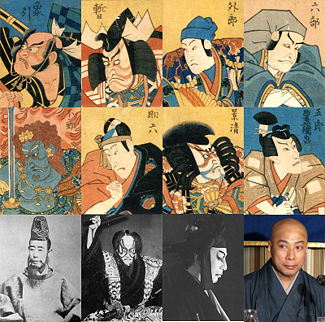
Ichikawa Danjuro
Encyclopedia

Kabuki
is classical Japanese dance-drama. Kabuki theatre is known for the stylization of its drama and for the elaborate make-up worn by some of its performers.The individual kanji characters, from left to right, mean sing , dance , and skill...
actors of the Ichikawa family. Most of these were blood relatives, though some were adopted into the family. It is a famous and important name, and receiving it is an honor. There are a number of roles that the line of Danjūrō specialize in, as well as a series of plays, the Kabuki Jūhachiban
Kabuki Juhachiban
The Kabuki Jūhachiban , or Eighteen Best Kabuki Plays, is a set of kabuki plays, strongly associated with the Ichikawa Danjūrō line of actors ever since their premieres. These works were chosen and assembled as "the eighteen" by actor Ichikawa Danjūrō VII . The pieces were considered to be...
(The Kabuki Eighteen), which showcase the specialties of the Ichikawa family.
Danjūrō, like other actors' names, is bestowed (or given up) at grand naming ceremonies called shūmei
Shumei
Shūmei are grand naming ceremonies held in Kabuki theatre. Most often, a number of actors will participate in a single ceremony, taking on new stage-names....
in which a number of actors formally change their names. The name Danjūrō is generally taken at the peak of an actor's career; another name may be taken after retirement. Prior to taking the name Danjūrō, an actor frequently had the names Matsumoto Kōshirō
Matsumoto Koshiro
Matsumoto Kōshirō is the stage name of a line of kabuki actors in Japan. Most of these were blood relatives, though some were adopted into the family....
, Ichikawa Shinnosuke
Ichikawa Shinnosuke
Ichikawa Shinnosuke is a stage name taken on by a series of Kabuki actors of the Ichikawa family. Most of these were blood relatives, though some were adopted into the family....
, or Ichikawa Ebizō
Ichikawa Ebizo
Ichikawa Ebizō is a stage name taken on by a series of Kabuki actors of the Ichikawa family. Most of these were blood relatives, though some were adopted into the family...
.
The design of the Ichikawa family mon
Mon (badge)
, also , , and , are Japanese emblems used to decorate and identify an individual or family. While mon is an encompassing term that may refer to any such device, kamon and mondokoro refer specifically to emblems used to identify a family....
, three squares nested inside one another, is called . Some of the actors in this line used "Sanshō" as their haimyō, a nickname or alias used in poetry circles.
Lineage
- Ichikawa Danjūrō IIchikawa Danjūrō IIchikawa Danjūrō I was an early kabuki actor in Japan. He remains today one of the most famous of all kabuki actors and is considered one of the most influential...
(May 1675 - February 1704) - also known as as a playwright; known as Ichikawa Ebizō I prior to taking the name Danjūrō. Originated the aragotoAragoto, or rough style, is a style of kabuki acting that uses exaggerated, dynamic kata and speech. Often, aragoto actors wear bold red or blue makeup , and have costumes that are padded and enlarged...
form. - Ichikawa Danjūrō IIIchikawa Danjūrō IIwas a Japanese kabuki performer in the lineage of a celebrated family of actors from the Edo region.Ichikawa Danjūrō is a stage name.Prior to 1735, Danjūrō I was known as Ichikawa Ebizō. He gave the name Danjūrō II to his son who was previously known as Ichikawa Ebizō II and Ichikawa Kuzō...
(July 1704 - November 1735) - Eldest son of Danjūrō I; previously known as Ichikawa Ebizō II and Ichikawa Kuzō. - Ichikawa Danjūrō III (November 1735 - February 1742) - Adopted son of Danjūrō II, previously known as Ichikawa Masugorō. Died young.
- Ichikawa Danjūrō IV (November 1754 - October 1770) - Adopted son of Danjūrō II, possibly biological son. Previously known as Matsumoto Kōshirō II and Ichikawa Ebizō III.
- Ichikawa Danjūrō VIchikawa Danjuro VIchikawa Danjūrō V , also known as Ichikawa Ebizō, was one of the most famous and popular Kabuki actors of all time. Throughout his career, Danjūrō would hold some of the highest ranks in the hyōbanki, an annual Edo publications which evaluated actors and performances...
(November 1770 - October 1791) - Son of Danjūrō IV. Previously known as Matsumoto Kōshirō III and Ichikawa Ebizō. One of the most famous of all kabuki actors. - Ichikawa Danjūrō VI (November 1791 - May 1799) - Son of Danjūrō V, previously known as Ichikawa Ebizō VI. Died young.
- Ichikawa Danjūrō VII (November 1800 - February 1832) - Grandson of Danjūrō V, previously known as Ichikawa Shinnosuke I, Ichikawa Yebizō, and later as Ichikawa Ebizō V. Established the Kabuki JūhachibanKabuki JuhachibanThe Kabuki Jūhachiban , or Eighteen Best Kabuki Plays, is a set of kabuki plays, strongly associated with the Ichikawa Danjūrō line of actors ever since their premieres. These works were chosen and assembled as "the eighteen" by actor Ichikawa Danjūrō VII . The pieces were considered to be...
. - Ichikawa Danjūrō VIIIIchikawa Danjuro VIIIIchikawa Danjuro VIII was a Japanese actor in the 19th century. He is known for his role as Prince Mitsuuji in the play Genji Moyo Furisode Hinagata. He played the role of Prince Mitsuuji in the first production in 1852...
(March 1832 - August 1854) - Eldest son of Danjūrō VII, previously known as Ichikawa Shinnosuke II and Ichikawa Ebizō VI. Committed suicide in Osaka. - Ichikawa Danjūrō IXIchikawa Danjuro IXIchikawa Danjūrō IX was one of the most successful and famous Kabuki actors of the Meiji period ....
(1874 - September 1903) - Fifth son of Danjūrō VII. Previously known as Kawarazaki Kennosuke VII, Kawarazaki Chōjūrō, Kawarazaki Gonjūrō, and Kawarazaki Sanshō. Star of the Meiji periodMeiji periodThe , also known as the Meiji era, is a Japanese era which extended from September 1868 through July 1912. This period represents the first half of the Empire of Japan.- Meiji Restoration and the emperor :...
's Golden age of Kabuki. - Ichikawa Danjūrō X (posthumous 1962) - Son-in-law of Danjūrō IX; previously known as Horikoshi Fukusaburō and Ichikawa Sanshō V. Played only minor roles, but revived many plays of the Kabuki JūhachibanKabuki JuhachibanThe Kabuki Jūhachiban , or Eighteen Best Kabuki Plays, is a set of kabuki plays, strongly associated with the Ichikawa Danjūrō line of actors ever since their premieres. These works were chosen and assembled as "the eighteen" by actor Ichikawa Danjūrō VII . The pieces were considered to be...
. - Ichikawa Danjūrō XI (April 1962 - November 1965) - Adopted son of Danjūrō X, his biological father was Matsumoto Kōshirō VIIMatsumoto Koshiro VIIMatsumoto Kōshirō VII was one of the leading tachiyaku Kabuki actors of Japan's Meiji period through the late 1940s.-Names:...
. Previously known as Ichikawa Komazō V and Ichikawa Ebizō IX. - Ichikawa Danjūrō XIIIchikawa Danjuro XIIis a Japanese actor. He is the twelfth kabuki actor to hold the illustrious name Ichikawa Danjūrō.He is the eldest son of Ichikawa Danjūrō XI. He first appeared on stage in 1953 under his birth name Natsuo Horikoshi, and in 1958 took the name Ichikawa Shinnosuke...
(April 1985–present) - Eldest son of Danjūrō XI. Previously known as Ichikawa Shinnosuke VI and Ichikawa Ebizō X. Danjūrō XII is the current holder of the name Ichikawa Danjūrō.
See also

- ShūmeiShumeiShūmei are grand naming ceremonies held in Kabuki theatre. Most often, a number of actors will participate in a single ceremony, taking on new stage-names....
- Ichikawa EbizōIchikawa EbizoIchikawa Ebizō is a stage name taken on by a series of Kabuki actors of the Ichikawa family. Most of these were blood relatives, though some were adopted into the family...
- related line of kabuki actors

